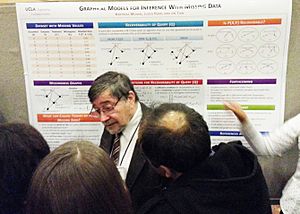Judea Pearl facts for kids
Quick facts for kids
Judea Pearl
|
|
|---|---|
| יהודה פרל | |

Pearl at NIPS 2013
|
|
| Born | September 4, 1936 |
| Nationality | Israeli American |
| Education | Israel Institute of Technology (BS) New Jersey Institute of Technology (MS) Rutgers University, New Brunswick (MS) New York University (PhD) |
| Known for | Artificial Intelligence Causality Bayesian Networks Structural Equation Modeling |
| Spouse(s) |
Ruth Pearl (née Eveline Rejwan)
(m. 1960; died 2021) |
| Children | 3, including Daniel |
| Awards | IJCAI Award for Research Excellence (1999) Turing Award (2011) Rumelhart Prize (2011) Harvey Prize (2011) BBVA Foundation Frontiers of Knowledge Award (2021) |
| Scientific career | |
| Fields | Computer science, statistics |
| Thesis | Vortex Theory of Superconductive Memories (1965) |
| Doctoral advisor | Leonard Strauss Leonard Bergstein |
| Doctoral students | Rina Dechter, Hector Geffner, Elias Bareinboim |
Judea Pearl (born September 4, 1936) is a famous Israeli-American computer scientist and philosopher. He is best known for his work in artificial intelligence (AI). He helped create a way for computers to think using probabilities, which led to the development of Bayesian networks. He also created a special way to understand "cause and effect" in the world, which is called causality.
In 2011, Judea Pearl received the Turing Award. This is one of the highest honors in computer science. He earned it for his important work in helping AI systems reason with probabilities and understand causes. He has written several books, including Causality: Models, Reasoning and Inference and The Book of Why. The second book helps everyone understand the idea of causality.
Judea Pearl is also the father of Daniel Pearl, a journalist. Daniel was kidnapped and murdered in Pakistan in 2002.
Contents
About Judea Pearl's Life
Judea Pearl was born in Tel Aviv, which was then called British Mandate for Palestine, in 1936. His parents were immigrants from Poland. He grew up in a town called Bnei Brak. His grandfather, Chaim Pearl, helped start Bnei Brak.
After serving in the Israel Defense Forces (Israel's military), Pearl decided to study engineering in 1956. He earned his first degree in electrical engineering from the Technion in 1960. That same year, he moved to the United States to continue his studies.
He earned more degrees in electrical engineering and physics from different universities. In 1965, he received his PhD in electrical engineering from the Polytechnic Institute of Brooklyn. He worked on special memory systems for computers. When new technology changed his field, he joined UCLA's School of Engineering in 1970. There, he began his important work on artificial intelligence that uses probabilities. He also helped start a journal about causal inference.
Today, Pearl is a professor of computer science and statistics at UCLA. He also directs the Cognitive Systems Laboratory there. He and his wife, Ruth, have three children.
Daniel Pearl's Story
In 2002, Judea Pearl's son, Daniel Pearl, was a journalist for the Wall Street Journal. Daniel was kidnapped and murdered in Pakistan. After this tragedy, Judea Pearl and his family and friends created the Daniel Pearl Foundation. This foundation works to promote understanding and fight hatred.
Judea Pearl has spoken about his son's death. He once said that he works for peace between different groups because "Hate killed my son. Therefore I am determined to fight hate." This shows his strong belief in fighting against hatred and promoting peace.
Judea Pearl's Ideas
Judea Pearl has his own personal beliefs. He is very connected to Jewish traditions, like celebrating holidays.
He is also part of the International Advisory Board for NGO Monitor. This is an organization in Jerusalem that looks at the activities of other non-governmental organizations.
Judea Pearl's Research and Impact
Judea Pearl is known for "laying the foundations of modern artificial intelligence." This means he helped create the basic ideas that allow computer systems to handle things that are uncertain. His work also helps computers understand how one thing causes another.
He was one of the first to develop Bayesian networks. These are special maps that show how different events are connected by probabilities. He also helped create a mathematical way to understand cause and effect in many areas of science. His ideas have changed how people think about causality in fields like statistics, psychology, medicine, and social sciences.
Important Books by Judea Pearl
- Heuristics, published in 1984.
- Probabilistic Reasoning in Intelligent Systems, published in 1988.
- I Am Jewish: Personal Reflections Inspired by the Last Words of Daniel Pearl, published in 2004. This book won an award.
- Causal Inference in Statistics: A Primer, written with Madelyn Glymour and Nicholas Jewell, published in 2016.
Awards and Honors
Judea Pearl has received many important awards for his work. Some of these include:
- The Turing Award from the Association for Computing Machinery (2012). This is often called the "Nobel Prize of computing."
- The BBVA Foundation Frontiers of Knowledge Award (2021).
- The Harvey Prize from Technion, Israel Institute of Technology (2012).
- The David E. Rumelhart Prize from the Cognitive Science Society (2011).
- He was named an Honorary Fellow of the Royal Statistical Society (2020).
- He became a member of the National Academy of Sciences (2014).
- He received honorary doctorates from many universities, including Yale University (2018) and Carnegie Mellon University (2015).
- He was honored with the Benjamin Franklin Medal in Computers and Cognitive Science (2008).
See also
 In Spanish: Judea Pearl para niños
In Spanish: Judea Pearl para niños
 | William L. Dawson |
 | W. E. B. Du Bois |
 | Harry Belafonte |

